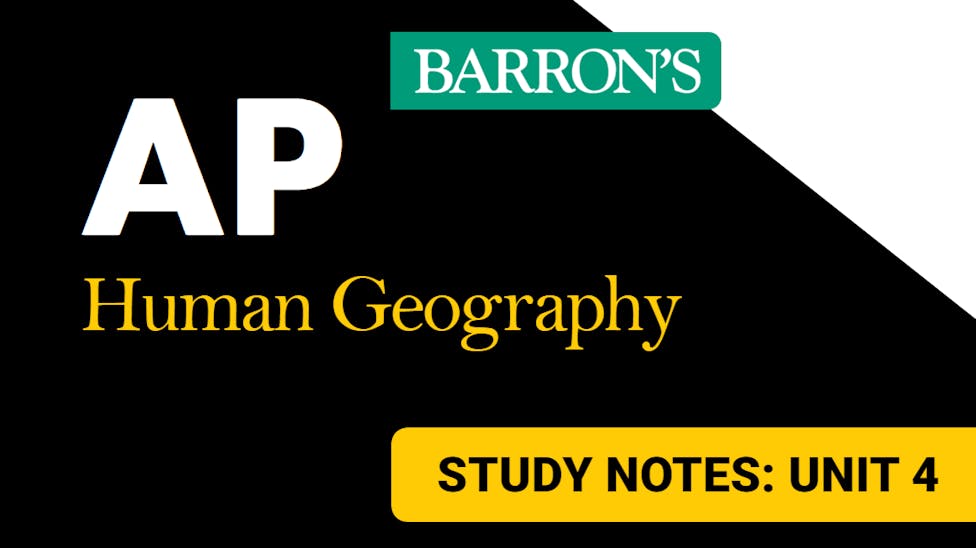AP Human Geography Unit 4: Political Patterns and Processes Notes
April 9, 2024

Use our concise AP Human Geography unit summaries and key terms to organize your studies in preparation for the AP Human Geography Exam. Read on for our AP Human Geography Unit 4 summary and key terms.
AP Human Geography: Unit 4 Summary
Political geography is one of the oldest fields in the discipline of geography. Political geographers use the spatial perspective to study political systems from local and regional politics, to national politics, to international politics. At local scales, political geographers study issues like territorial organization, representation, and voting patterns. At national and international scales, geographers study the relationship between physical geography and politics, the historical geography of colonialism and imperialism, the formation of international alliances, and the current political tensions between the wealthy countries of the industrialized north and the poorer countries of the less-developed south.
AP Human Geography: Unit 4 Key Terms
- Antecedent boundary: A boundary line established before an area is populated.
- Balkanization: The contentious political process by which a state may break up into smaller countries.
- Buffer state: A relatively small country sandwiched between two larger powers. The existence of buffer states may help to prevent dangerous conflicts between powerful countries.
- Centrifugal forces: Forces that tend to divide a country.
- Centripetal forces: Forces that tend to unite or bind a country together.
- Colonialism: The expansion and perpetuation of an empire.
- Commonwealth of independent states: Confederacy of independent states of the former Soviet Union that have united because of their common economic and administrative needs.
- Compact state: A state that possesses a roughly circular, oval, or rectangular territory in which the distance from the geometric center is relatively equal in all directions.
- Confederation: A form of an international organization that brings several autonomous states together for a common purpose.
- Democratization: The process of establishing representative and accountable forms of government led by popularly elected officials.
- Devolution: The delegation of legal authority from a central government to lower levels of political organization, such as a state or country.
- Domino Theory: The idea that political destabilization in one country can lead to collapse of political stability in neighboring countries, starting a chain reaction of collapse.
- East/West divide: Geographic separation between the largely democratic and free-market countries of Western Europe and the Americas from the communist and socialist countries of Eastern Europe and Asia.
- Electoral college: A certain number of electors from each state proportional to and seemingly representative of that state’s population. Each elector chooses a candidate, believing they are representing their constituency’s choice.
- Electoral vote: The choice expressed collectively by the electoral college to determine the president and vice-president of the United States.
- Elongated state: A state whose territory is long and narrow in shape.
- Enclaves: Any small and relatively homogenous group or region surrounded by another larger and different group or region.
- European Union: International organization comprising Western European countries to promote free trade among members.
- Exclave: A bounded territory that is part of a particular state but is separated from it by the territory of a different state.
- Federalism: A system of government in which power is distributed among certain geographical territories rather than concentrated within a central government.
- Fragmented state: A state that is not a contiguous whole but rather separated parts.
- Frontier: An area where borders are shifting and weak and where peoples of different cultures or nationalities meet and lay claim to the land.
Check out our full AP Human Geography Unit 4 Notes.
AP Biology Resources
- About the AP Biology Exam
- Top AP Biology Exam Strategies
- Top 5 Study Topics and Tips for the AP Biology Exam
- AP Biology Short Free-Response Questions
- AP Biology Long Free-Response Questions
AP Psychology Resources
- What’s Tested on the AP Psychology Exam?
- Top 5 Study Tips for the AP Psychology Exam
- AP Psychology Key Terms
- Top AP Psychology Exam Multiple-Choice Question Tips
- Top AP Psychology Exam Free Response Questions Tips
- AP Psychology Sample Free Response Question
AP English Language and Composition Resources
- What’s Tested on the AP English Language and Composition Exam?
- Top 5 Tips for the AP English Language and Composition Exam
- Top Reading Techniques for the AP English Language and Composition Exam
- How to Answer the AP English Language and Composition Essay Questions
- AP English Language and Composition Exam Sample Essay Questions
- AP English Language and Composition Exam Multiple-Choice Questions
